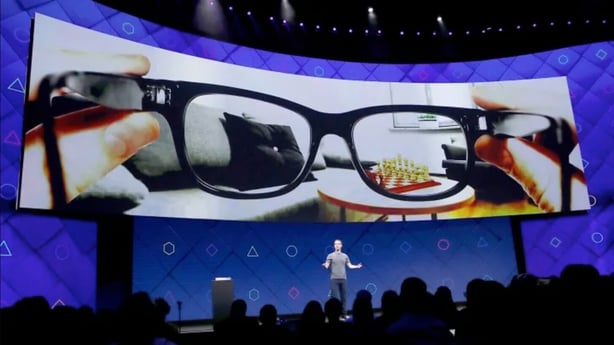There is a new way to look fly in your sunnies this summer. Meta, the company behind Instagram and Facebook, has partnered with Ray-Ban to produce glasses that record pictures and video.
These glasses are legal, and currently available to Irish consumers.
But are smart glasses the future of how we interact with our world? Or are they a serious invasion of privacy?
In a time where more of our activity is being recorded, Meta CEO Mark Zuckerberg described the sunglasses, known as Ray-Ban Stories, as a way to capture photos and videos, to listen to music or podcasts, or to take phone calls "all while staying in the moment and without even taking out your phone".
Though the glasses feature an LED light that activates when the glasses are in record mode – to notify others nearby – they have caught the attention of Ireland's data protection regulator.
In a statement following their introduction in Ireland, the Data Protection Commission said it was "concerned about the means by which those captured in the videos and photos can receive notice they are being recorded".
"The Data Protection Commissioner is not convinced the little light that flashes is enough notification to people that they are being recorded," Valerie Flynn, a Sunday Times journalist, told Prime Time.
"Facebook says that, when you hold up your phone to record something, there is no little light – so isn't this better? The Data Protection Commissioner says the light is 'very small' – that's their words. So how are you really supposed to know?"
The Data Protection Commission called on Meta "to confirm and demonstrate that the LED indicator light is effective for its purpose and to run an information campaign to alert the public as to how this new consumer product may give rise to less obvious recording of their images".
In recent months, Meta and EssilorLuxottica, the Italian parent company of Ray-Ban, did just that, by placing ads in newspapers and on the radio airwaves. Meta Ireland said it would work with the Data Protection Commission to help people understand the product.

The campaign explains to the public how Ray-Ban Stories work, how best to use them, and how to identify when someone is recording with them.
As part of a report for the Sunday Times, Ms Flynn wore the glasses out and about for the day – on the street, in a cafe, in a shopping centre, in a playground, and in a courtroom.
She did not record in the playground or in the courtroom, for obvious reasons.
Regardless, only one person – a lady on Grafton Street, seemed to clock that she was wearing them, Ms Flynn said.
"Other than that, people did not seem to be aware."
Privacy concerns aside, Mr Zuckerberg believes these glasses are here to stay.
He envisions later editions that will do much more than record footage or play audio. Instead, they will also augment the reality you see through the frames with images and information, what's known as AR, or augmented reality.
"AR will definitely come to these glasses. It just depends on how they want to deploy it, what they're allowed to do, and whether or not people will be interested in embracing it," Dr Sally Applin, an anthropologist, told Prime Time.
Other firms such as Snap, Apple and Google are rumoured to have similar glasses in the works.
"This conversation isn't necessarily just about glasses. Glasses are a mechanism to collect a particular kind of data in the world – and it is the data that will develop into something," Dr Applin said.
"We are feeding a bigger machine, and that bigger machine may come back later with information about us that we didn't want it to have."


